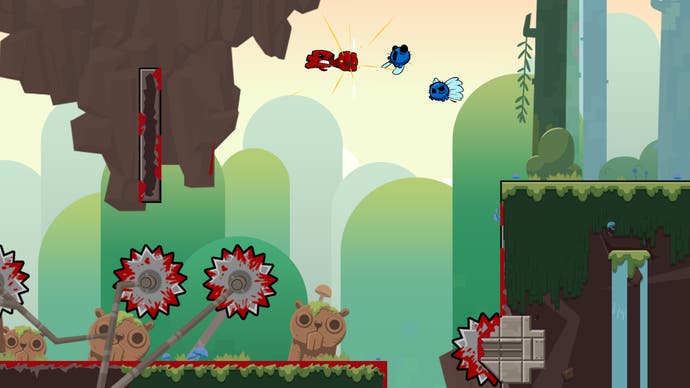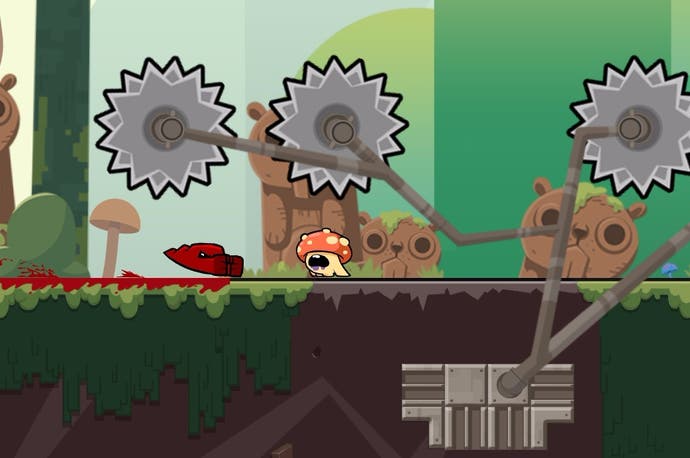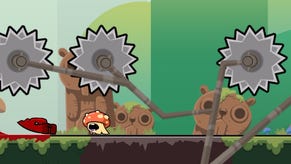Super Meat Boy Forever does more with two buttons than most do with 14
Meat's expectations.
Let's get the bad news out of the way first: Super Meat Boy co-creator and character designer Edmund McMillen, the burly bearded man made famous by his starring role in Indie Game: The Movie, is not involved in the sequel, Super Meat Boy Forever. Having gone independent to work on such titles as The Binding of Isaac, The End is Nigh, and the upcoming RPG The Legend of Bum-bo, the Super Meat Boy saga has fallen to his former partner, Tommy Refenes, to resurrect after a seven-plus year absence.
Skepticism may be bolstered by the fact that Super Meat Boy Forever was in limbo for a few years after being initially announced as a mobile-only title, suggesting a subordinate spin-off. In fact, this sequel only uses two buttons. And I don't mean two buttons and a D-pad, I mean two buttons in total.
On paper it sounds pretty pared down, but in practice it's anything but. Having played a handful of its stages at PAX West, I can confirm that Super Meat Boy Forever is every bit as deep, addictive, and challenging as its predecessor.
Unlike the original Super Meat Boy, this sequel makes Meat Boy (or his partner, Bandage Girl, if you'd prefer) run automatically. The player is only in control of two things: jumping and sliding. Hit the jump button while in mid-air, however, and Meat Boy will thrust forward his gigantic Battletoads-inspired fist, smashing any foes in the way and propelling his momentum. Hold the slide button in mid-air and you'll plummet downwards, altering your trajectory on a whim.
It sounds simple, but there's a shocking amount of minutia to Meat Boy's momentum. The longer you hold the jump button down the longer you'll leap, and even with your muscle memory refining its routes you'll find yourself making all new mistakes at a moment's notice. Like the original game, your paths in Super Meat Boy Forever remain marked with blood, letting you know what surfaces you've touched in previous attempts. This is important as unlike many auto-running affairs, Super Meat Boy Forever doesn't just task you with sprinting from left to right, but moving in all directions as a bounce off one wall will leave your character scrambling in the opposite direction. Playing over a half-hour of this sequel I couldn't count all the ways I'd mess up surmounting an obstacle only to find some completely new way to propel myself into the place.
While my playtime with Super Meat Boy Forever is on Switch, Refenes assures me that it works just as well on mobile devices as the screen invisibly divides its controls so tapping on one side jumps and the other side slides, while the dev made an effort to keep the lower corners clear of obstacles, allowing unobstructed space for the player's thumbs.
Aside from the controls feeling absolutely spot-on, Super Meat Boy Forever's other prominent feature is that levels get harder when you replay them. There is a limit to this, with the current build topping out after four increasingly brutal iterations to each stage, but it effectively quadruples the length of the game for the most diehard fans. Beyond that, there's the usual Dark Worlds and Warp Zones that offer even more extreme challenges. In short, there is a lot of content in Super Meat Boy Forever.
While this sequel uses some degree of procedural generation, when you exit to the map screen and re-enter a stage, it's hardly random as Team Meat took great strides to pace its hazards in ways that feel curated. "In the original 2014 [build of the] game we just randomly threw [procedurally generated] chunks at you until you got to the end," Refenes tells me of Forever's initial iteration. "The way levels were created is they were all miniature levels and then we put them together based on difficulty criteria."

"We found that the levels needed a cadence to them, because you don't want to throw a whole bunch of hard stuff at somebody, or a whole bunch of easy stuff. You want to be able to ramp them up. Here's a little bit hard. You beat this hard thing. Now turn it down a little bit then ramp it back up," he explains. "We were going to use that to keep keep creating randomly generated levels, but randomly generated levels that make sense and feel like they actually have design to them. That have a particular cadence to them and don't just punish you."
Refenes is adamant that while Super Meat boy Forever began development as a mobile game, it grew tremendously once he uncovered how many possibilities the new control scheme opened up.
"When we restarted development this year it was more about finishing the original vision, but in typical developer fashion you start playing something and thinking 'Oh this would be cool! This would be cool!' And then you start thinking 'Why not make it into something grand?'" Refenes reflects. "Because the gameplay is great on controllers. It doesn't have to just be a mobile game. And we can do a lot with a sequel. Why not just go all out?"
"Once it made sense as more than just a mobile game. I didn't want to just take something small and put it on consoles. In terms of content and everything, this is easily triple or quadruple what the original scope of the game was and it feels really good to be able to do that."
Yes, Super Meat Boy Forever began as a mobile game, and yes, McMillen may not be on board, but you'd never know it. Refenes has grown Team Meat on his own and turned it into something spectacular: a stellar platformer that transcends the limits of what the genre can do on a touchscreen. Meat Boy without McMillen or an analogue stick may sound blasphemous, but after mere moments with this successor, neither are missed.















